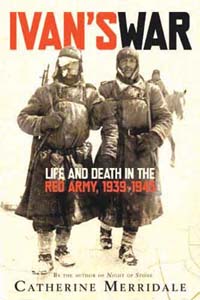 IVAN’S WAR by Catherine Merridale BUY THIS BOOK |
As civilians, we can never understand combat, or empathize with those who have seen it. Samuel Fuller, a World War Two infantryman who saw combat in France — and who later, as a Hollywood director, recalled his trauma in The Big Red One — said it was impossible to convey what he had seen to a civilian audience. To give them some inkling of war, he said, he’d have to flood the cinemas with mud, outfit the audiences in shredded, blood-stained fatigues, and then fire live ammunition over his customers’ heads.
My father served in Samuel Fuller’s war, albeit on the other side of the world, in the island-hopping campaigns of the Pacific. He was singularly close-mouthed about combat, perhaps because, as a quartermaster sergeant in an artillery outfit, he’d seen rather little of it. He conveyed to me some of the patriotic fervor that inspired the first volunteers of 1941 — he was one of those who’d rushed the recruiting offices after Pearl Harbor — and he was proud of his regiment’s victories overseas. But he was quick to contradict my boyish notion that American heroism had crushed the Axis. That was so much hokum, he laughed. Paraphrasing Churchill, he said we owed the victory to “Soviet bayonets”: it was the Soviets, he said, who’d “gutted the beast,” after being mauled themselves nearly to death.
And indeed he was right, at least as regarded the European Theater. Eighty percent of German casualties were sustained on the Eastern Front, in combat with Soviet armies. But gutting and killing the beast came at great cost: Soviet war losses were far greater than the Nazis’: 29 million Soviet citizens perished. The historians still dispute the statistic, as if one could quantify such grief; well over a million gave up their lives to starvation in the siege of Leningrad alone. The dead were counted in hecatombs. For every U.S. serviceman killed, over 100 Soviet citizens died.
In Ivan’s War, the accomplished English historian Catherine Merridale sets forth the sacrifices made by the Soviet rank and file — by “the Ivans,” the Soviet G.I.s who stood fast at Stalingrad, smashed the Panzer armies at Kursk, and stormed the Fuehrer’s stronghold at Berlin. Delving into newly-opened military archives, perusing the letters and diaries of the frontoviks — front-line combatants — she inquires deeply into the motivations of the Red Army’s soldiers. What made them fight on as they did? she asks.
There were two factors in the main: first desperation, then revenge. In the catastrophic summer of 1941, when Wehrmacht columns marched on Moscow and Soviet collapse seemed imminent, the soldiers fought out of desperation: the fear of annihilation that drove a women’s battalion at Brest Fortress to fight to the death, despite a furious bombardment and the onslaught of vastly superior forces. After the Soviets’ decisive victory at Stalingrad, desperation gave way to hatred and the desire for revenge. The troops that discovered the burial pits of Babi Yar and the death camps of Maidanek and Treblinka fell upon “accursed Germany” with an Old Testament fury. They wanted blood for blood.
There were other factors that steeled the Soviet will to resist and conquer. Patriotism, yes: a primeval love for rodina, the Motherland. But more than that: for millions of soldiers, a lingering faith in the utopian ideals of Soviet Communism. Despite the purges that liquidated the last of Lenin’s cadres, despite Stalin’s betrayal of the Revolution’s promise, millions believed in what might have been, and what could still be: something that can only be called socialism. Merridale is tempted to dismiss this faith as superficial, even absurd; but she concedes that it stiffened the resolve of many front-line fighters. She cites the example of one Mikhail Ivanovich, an infantry officer in an elite brigade whose faith sustained him on a forced march — through 150 miles of icy swamps — behind the Nazi lines. For those who called themselves comrades, Merridale writes,
Communism was a far cry from the theoretical manuscripts. The soldiers put their faith in progress, in the collective, in [the acquisition of military] skills. What they called Communist belief was [faith in] the victory of a just cause over the darkness . . . [a] victory that seemed to attest that this people could never be enslaved.
In a letter to Alan Clark — the author of Barbarossa, a magisterial history of the Russo-German war — one Soviet veteran wrote of the inspiration that socialism offered:
Even those of us who knew that our government was wicked, that there was little to choose between the SS and the NKVD except their language, and who despised the hypocrisy of Communist politics — we felt that we must fight. Because every Russian who had lived through the Revolution and the thirties had felt a breeze of hope, for the first time in the history of our people. We were like the bud at the tip of a root which has wound its way for centuries under rocky soil. We felt ourselves to be within inches of the open sky.
We knew that we would die, of course. But our children would inherit two things: A land free of the invader; and Time, in which the progressive ideals of Communism might emerge.
The Soviets fought superbly. Denied liberty themselves, they nevertheless helped to save the West from slavery and fascism. Denied any voice of their own, they yet preserved democracy — and the prospect of a democratic socialism — from a genocidal regime’s devastation.
Dean Ferguson is an editor of Transformation, a newly launched literary journal. He lives and works in San Francisco.
|
| Print
